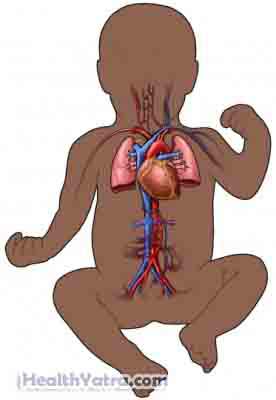परिभाषा
Oxygen is needed in every cell of our body. It first enters the body through the lungs. The oxygen is then picked up by the blood flowing by the lungs. The blood brings oxygen to the rest of the body. In newborns with persistent pulmonary hypertension (PPHN), the blood does not flow by the lungs.
The baby’s lungs are not used during pregnancy. Instead, oxygen passes from the mother to the baby through the umbilical cord. This means most of the baby’s blood does not need to pass by the lungs. Once the baby is born, the baby’s lungs should take over. The blood flow should switch so that it will pass by the lungs. In babies with PPHN, this switch doesn’t happen. The blood does not flow go to the lungs as it should. This means that oxygen can not move from the lungs to the rest of the body.
PPHN can be a very serious condition. It can cause both immediate and long-term health problems. It affects about one in every 500-1500 births.

का कारण बनता है
PPHN can be caused by a variety of factors, including:
- An event or illness during pregnancy or childbirth
- Meconium aspiration syndrome (the baby inhales meconium—the first stool—prior to or shortly after birth)
- गंभीर निमोनिया
- संक्रमण
- निम्न रक्त शर्करा
- Birth asphyxia (loss of oxygen to the fetus during delivery)
- Respiratory distress syndrome —caused by lungs that have not fully developed
- Use of nonsteroidal anti-inflammatory medications (such as aspirin, ibuprofen, naproxen) by mother during pregnancy
- Late trimester maternal use of antidepressants (particularly a group called SSRI antidepressants)
- Amniotic fluid leak
- Low amniotic fluid (oligohydramnios)
- Abnormal lung development as a result of congenital diaphragmatic hernia or Potter syndrome
- Stress during pregnancy
- Isolated condition with an unknown cause
जोखिम कारक
Factors that may increase your baby’s chance of developing PPHN include:
- Stress to the fetus during pregnancy or delivery
- Health conditions of the mother, including diabetes
- Complications during birth or pregnancy
लक्षण
लक्षणों में शामिल हैं:
- Rapid breathing—tachypnea
- Rapid heart rate— tachycardia
- Difficulty breathing—signs may include flared nostrils or grunting
- Blue tint to the skin, even when the baby is receiving oxygen
निदान
Your doctor will ask about your baby’s symptoms. Your pregnancy history may also be reviewed. A physical exam will be done.
परीक्षण शामिल हो सकते हैं निम्नलिखित:
- Chest x-rays —to help diagnose lung disease or enlarged heart
- Echocardiogram —ultrasound of the heart to show the baby’s circulating blood flow
- Head ultrasound —to look for bleeding in the brain
- Laboratory tests
- Arterial blood gas (ABG)—measure oxygen in the blood
- Complete blood count (CBC)—measure blood components like red blood cells
- Serum electrolyte tests
- Pulse oximetry monitoring—continuous monitoring of oxygen levels in the blood
उपचार
Talk with your doctor about the best treatment plan for you. Treatment for PPHN is typically administered by a doctor who specializes in newborn illness.
Treatment begins with correcting any related conditions. These conditions can include low blood sugar, low oxygen levels, low blood pressure, and low blood pH. Treatment options include:
Ventilator
A ventilator is a machine that will help your baby breathe. A tube will be placed in the baby’s throat. The tube is collected to the ventilation machine. The ventilator will deliver oxygen with gentle pressure. The pressure will help keep the lungs open.
Nitric Oxide
Nitric oxide is a gas. It may be delivered during ventilation. Nitric oxide may relax blood vessels. This will improve the flow of blood in the lungs.
दवाएं
There are a number of new medication that are being. One example is a medication called sildenafil (eg Viagra®). Small studies have shown positive results with sildenafil. However, larger studies are needed to confirm the benefits and safety of the medication.
Extracorporeal Membrane Oxygenation (ECMO)
ECMO is a machine that can take over the job of the lungs. It requires major surgery. ECMO may be done if your child has a severe cases of PPHN that is not responding to other treatments. This procedure is done to take some stress off of your baby’s body. It can give your baby some time to heal.
रोकथाम
Most cases of PPHN have no clear cause or are caused by uncontrollable events. For these cases there are no clear preventative steps. Some cases of PPHN may be prevented with proper prenatal care and good health of the mother during pregnancy. General tips for a healthy pregnancy include:
- Get good prenatal care. Start as early as possible in pregnancy.
- Eat a healthful diet. Take vitamins as suggested by your doctor.
- Do not smoke. Avoid alcohol or drug use.
- Only take medicines that your doctor has approved.
